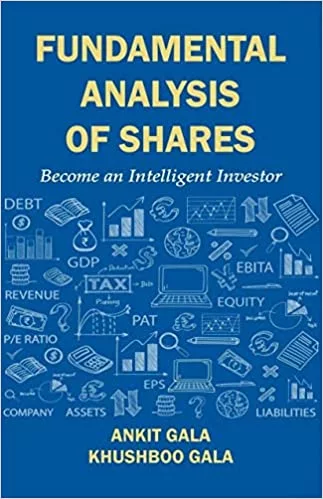Fundamental Analysis of shares, Become an intelligent investor By Ankit Gala & Khusboo Gala

Hey there, great men say that you should make money while you sleep. If you agree with that saying then you should check the stock market or start your own business which can run without your presence. Historically many men & women have made a good sum of money in the long term by investing in the right stock. Hey, the key to remember is Right stock. How do you know if you have chosen the right stock? The answer lies in the fundamental analysis of the stock.
When I was at the book, my eyes fell on the books titled Fundamental analysis of shares by Ankit Gala & Khusboo Gala. I was interested in the book because I too wanted to stay invested in stocks.
About the authors
When you are choosing a subject that is about money, it's better to listen to the experts. Both authors have strong financial backgrounds and they have an understanding of the mindset of the retail investor.
In the preface, they mention that 90% of retail investors lose money in the stock market. This is because retail investors generally do little to no research about the stock. They listen to friends, and stock picks or tell a comfortable lie to themselves. The authors have given their best shot at breaking this practice by writing concisely about fundamental analysis.
Top 3 ideas from the book
This book is not about ideas, it's about technical terms and definitions. Quoting a few of them.
Fundamental analysis
If you are a day trader, then fundamental analysis is not required. If you are a long-term investor, then fundamental analysis is really important.
Fundamental analysis is the method of finding the intrinsic value of the stock to find long-term investment opportunities.
EIC analysis
- Economic
- Industry
- Company
4 phases of the economy
- Expansion Phase
- Recession phase
- Depression phase
- Recovery phase
2 phases of market
- Bull market
- Bear market
There is a difference of around 4 to 6 months between the economic phases and market phases to follow.
Ideally investments should be done at the start of the expansion phase and should be divested at the start of the recession phase.
Industry analysis
- Startup stage
- Growth stage
- Consolidation stage
- Maturity stage
- Decline stage
Classification of Industry
- Growth industries
- Cyclical industries
- Defensive industries
- Cyclical growth industries
Financial statements
- Balance sheet of the company - to get a snapshot of what the company owns vs what it owes. Key terms assets & liabilities.
- Profit & loss account of the company - to analyze the fundamentals of the company. Also known as income statement. Key terms expenses, tax, profits, etc.
- Cash flow statement - helps to understand how company operations are running.
- Statement of changes in equity
Financial ratios
- Profitability ratios
- Liquidity ratios
- Management efficiency ratios
- Leverage ratios
- Valuation ratios
Useful websites
- Screener. in
- Tickertape
- Equitymaster
- Value stocks
Verdict
Overall a great attempt to write about fundamental analysis of stocks from an Indian market context. Though the book looks small, it's a heavy read and someone new to finance has to read, re-read and discuss with peers to gain a deeper understanding.
Blindly following stock picks by big investors is not a wise thing to do - Rakesh Jhunjhunwala